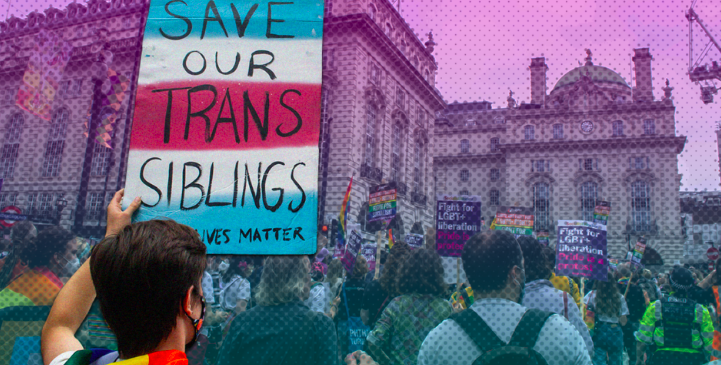This Pride month is a one of great fear and grief for many. After decades of (slowly) advancing queer rights, we are in the midst of the worst backlash we’ve seen in years. Laws are being passed across the country that dramatically roll back queer rights and specifically target trans children. These policies being put forward by far-right politicians would (in effect) forcibly detransition and socially isolate trans children, and in many cases they are already being used to attack the lives of trans people.
These attacks are in direct contradiction with supposed ideas about progress that many of us have been told for years. This can have a demoralizing effect, making us feel as if struggling for our rights is futile, since the right wing seems so much more powerful than we are. And it’s true, the forces opposed to us are strong and organized, consisting of the state, which is happy to restrict our rights; corporations, which just want us to be good little exploited workers and consumers for them; and groupings of far-right bigots, who are intent on eliminating us from existence. This, understandably, can feel daunting.
Yet we should not give up hope. Quite the opposite: we must use this Pride month to reinvigorate ourselves and our movements, finding a rage at these attacks that leads us to organization. Like our ancestors did at Stonewall, with ACT UP, Lesbian and Gays Support the Miners, and other struggles, we must fight these attacks and organize together for a better world. And we should take inspiration from the Ni Una Menos movement in Latin America, which fought against femicides and laid the groundwork for the successful struggle for abortion rights. They chart the way forward in our struggle for trans rights and for bodily autonomy for all.
Not One Less
On June 3, 2015, hundreds of thousands of protesters filled the streets of Buenos Aires in front of the National Assembly. They were furious after yet another shocking murder of a woman at the hands of her male partner. Outraged at the rate of femicides, people organized not just in Buenos Aires but across Argentina and in other countries throughout Latin America. These protesters raised a simple slogan, first on social media and then on the streets: Ni una menos (Not one [woman] less). What this slogan meant to these protesters is that not one more woman should lose her life to patriarchal violence. Another slogan the movement eventually took up was “Vivas nos queremos” (We want us alive).
These mobilizations and slogans began to spread and grow. Activists and organizations, including Bread and Roses, organized assemblies to build the movement. Eventually, the movement included a mass protest on October 19, 2016, which called on workers to walk off the job. These experiences also provided a launching pad for the mass Green Bandana movement, which successfully fought for the legalization of abortion in Argentina.
What is important about this movement, from a U.S. perspective, is that it translated rage into organization, which then allowed for the conquest of greater rights. The right to an abortion was won on the streets in Argentina thanks to the heroic organizing of millions of people throughout the country. And because socialists participated, the movement called on unions and the labor movement to strike, pointing to the necessity to really shut it down. It demanded more and organized sectors of the working class to use their power as workers — through strikes and work stoppages — to aid the movement in their offensive demands. The movement also used self-organization — through assemblies — to build the strength of the movement and show people a political outlet for their rage at the system that oppressed them. As Bread and Roses, a socialist feminist grouping in many Latin American countries, put it, “The women of Bread and Roses refuse to be the powerless victims that the patriarchy demands. The conditions that ‘victimize’ us are also the source of the productive hate towards an oppressive social order and stirs powerful convictions to act in solidarity with millions of others around the world.”
The women of Argentina felt a “productive hate” and used it to build a movement for abortion rights under the banner of “not one more.” They refused to accept even one more life lost to capitalist and patriarchal oppression. They “wanted us alive.”
We Want Us Alive
These tactics and slogans are things that activists in the U.S. should look to for inspiration. It is vital that we build a movement, knowing that it’s possible to win. But Bread and Roses points to a struggle not only for these minimal demands: don’t kill us, give us our right to our body. Our lives should not be filled by an endless defense of our humanity. Our lives should not be spent in constant struggle forever. Our lives are worth more than they are valued.
We must, before all else, demand the immediate repeal of every anti-queer law in the country.
We must demand better lives, lives free of oppression and exploitation, lives in which we can fully develop our bodies and sexualities.
We must organize and demand that not one more of us falls victim to this heartless system. Not one more trans child deprived of health care, not one more queer person in poverty, not one more queer or trans suicide. Not one more.
During Black Lives Matter, a common chant was “Who keeps us safe? We keep us safe.” Along those lines, if we want our community to stay alive, it is we who must organize to keep us alive. We Want Us Alive.
This Pride should be a time of rage and organization, of struggle and solidarity, of a rebirth of the queer movement that has long been defanged by collaborators of the state. But we are in a new political moment, when young, newly politicized, and largely queer people are entering the labor movement and trying to organize sectors that are unorganized; when unionists are more and more fighting for the demands of the oppressed as well; and when the memories of BLM and the militant mobilizations are fresh. The queer movement needs to take up its historical task in the current moment and fight for queer liberation. To fight for not one more, to fight for keeping us alive. And we must be the ones to take the reins of our movement and lead it into the future.











